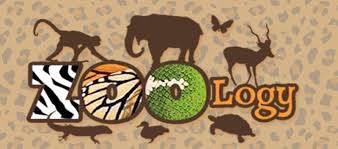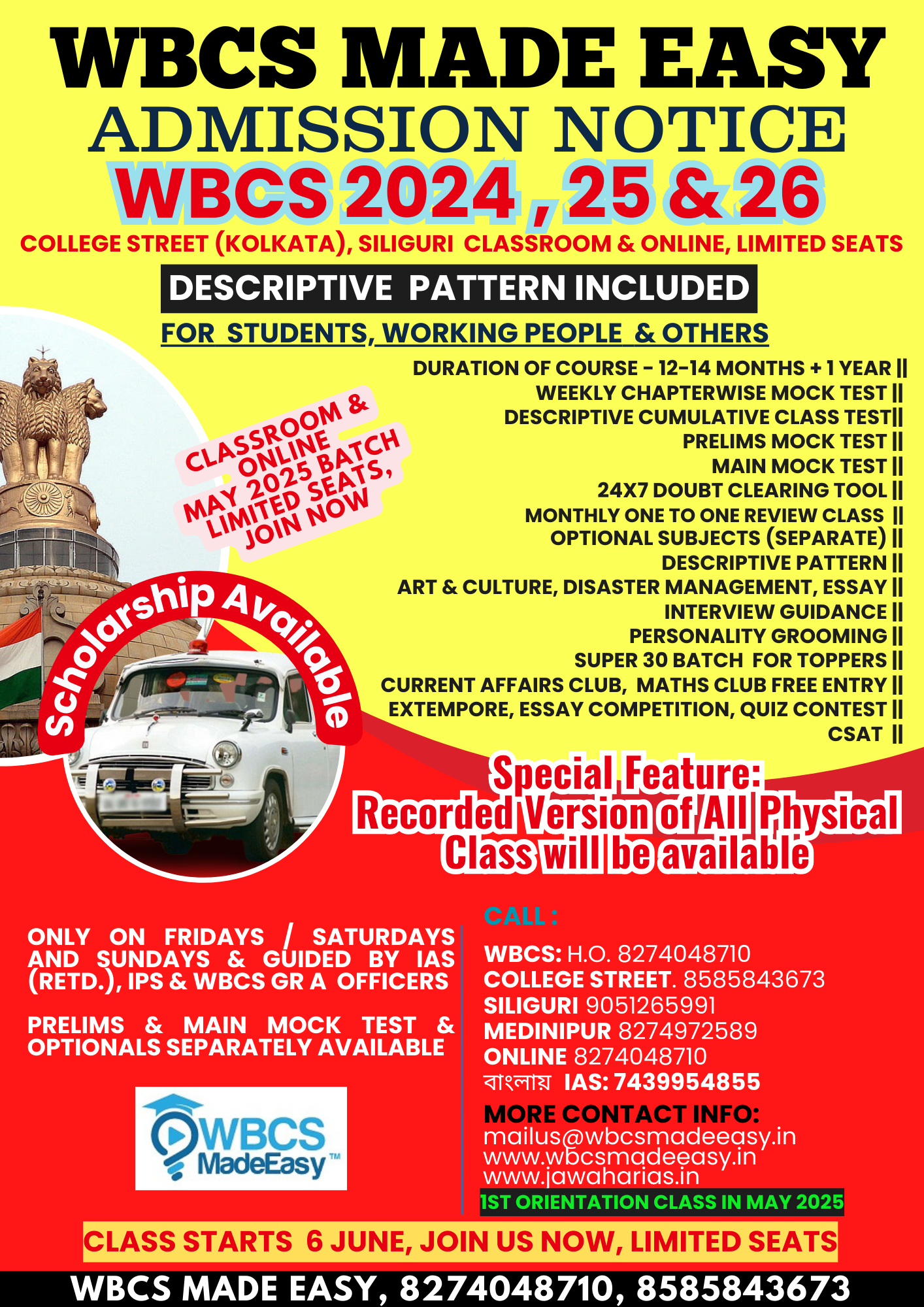WBCS Exe Etc Exam Main Optional Subject Zoology Syllabus
Paper – I :
Group A :
Short/objective questions.Continue Reading WBCS Exe Etc Exam Main Optional Subject Zoology Syllabus
This group will cover the whole content of the Paper (I)
Group B : Non-Chordata & Chordata
01. Outline classifications of Protozoa upto Phyla
02. Outline classifications of Porifera to Hemichordata upto classes.
03. Classification of chordata upto orders.
Non Chordata Locomotion in Protozoa Annelida, Insecta & Mollusca,
Excretion and Osmoregulation in Cnidaria , Annelida, Arthropoda & Mollusca.
Sense organs in Mollusca and Arthropoda.
Specialized Features:
Conjugation in ciliates
Polymorphism in Siphonophora,Notochord, Coral reefs: types and formation
Evolutionary position of Onychophora, Limulus
Social Organisation in insects – Honey bee & Termites
Chordata Specialized Features:
Ciliary mode of feeding in lower chordates.Endrocrine glands in insects.
Integumentary derivatives in mammals.
Comparative anatomy of heart, aortic arches & Kidney
Respiratory structure and function in fish, bird and mammals, Coelom In Annelids.
Ruminant stomach.Human and Animal viruses.
Evolutionary position of Sphenodon and Monotremata
Poison apparatus, Biting mechanism and types of poison in snakes.
Retrogressive metamorphosis, Neoteny and paedogenesis.
Migration of Birds
Aerodynamics in birds flight.
Echolocation in Chiroptera and Caetacea, Echinodermata.
Group C : Ecology, Biodiversity and Ethology
Energy flow, Population Dynamics — Growth forms, mortality, natality, population density regulation.
Niche concept and resource Partitioning, Wildlife,
Ecological succession.
Pollution :
Green house effect, Pollutants types and nature. Acute and chronic toxicity due to air and water pollution.
Innate and learned behaviour, FAP (Fixed Action Plan), Selfishness, Co-operation, Altruism and Kinship
Biodiversity :
Definition, Levels, values, in-situ and Ex-situ conservation,National Parks And Bioshpere Reserves, Hot spots, megadiversity
countries, Biopiracy.
Wildlife management strategies with reference to Tiger, Rhino and Elephant,
Elementary concept on remote sensing for sustainable diversity.
Systematics and Quantitative Biology
Codes of Zoological nomenclature, species concept, phenetics and cladistics.
Measure of Central Tendency, Probability, Student t test Chi square, ANOVA, Goodness of fit.
Paper – II :
Group A : Short/objective questions.
This group will cover the whole content of the Paper (II)
Group B :
Cell Biology & Genetics :
Ultra structure & functioning of – Plasmamembrane, Golgi complex, Mitochondria, ER, Lysosome, Mitochondria, Chromosome, Nucleosome, Cell cycle.
Allele :
Types, ABO blood group, Bombay phenotype, 3 point chromosome mapping in diploid with
problems. Autosomal & sex linked inheritance in Drosophila & Man, Sex determinations in Drosophila & Man.Cytoplasmic Inheritance, Replication, Transcription and m RNA processing & Translation in prokaryots. Operon concept – Lac & Tryptophan, Mutations & Mutagenesis, Down, Klinefelter and Turner syndrome, Albinisim, Sickle cell anaemia, Thalassemia, Recombinant DNA :Vector, Vaccination , Principle of cloning, Restriction Endonucleases
Transgenic animals. Role of protooncogene & Tumor Supressor Genes. Human Genome Project.
Histology & Endocrinology :
Histology :
Cell types and functions. Pituitary, endocrine pancreas, gonads, Thyroid, adrenal.
Mechanism of hormone action, Basic concept of cell signalling. Hormonal control of reproductive cycles in mammals, Physiology of digestion. General idea of insect endocrine glands and their function.
Physiology & Biochemistry :
Enzymes :
Classes, kinetics and factors affecting enzyme action.
Osmoregulation :
Types and mechanism in aquatic vertebrates.
Macromolecules :
Protein, fat & carbohydrates. Glycolysis, pentose phosphate pathway, Transamination & oxidative and non-oxidative deamination. Role of haemoglobin in oxygen & carbon di oxide transport, Catabolite Repression , Foetal haemoglobin, Genetic Engineering ,Physiology of nerve impulse and propagation, Muscular contraction, Vitamines.
Principles and use of instruments – Spectrophotometer, ATP generation, TLC, RAPD, RFLP, PCR, ELISA , DNA finger printing.
Group C :
Developmental Biology
Gametogenesis, fertilization, IVF basic concept, cleavage-types and examples. Gastrulation in frog and chick.
Organizer, induction and competence. Placenta : Types and formation. Organogenesis : Eye and heart.
Evolution & adaptation :
Origin of life, natural selection : modern view, Neutral theory.
Evolution : Elephant, Horse & Man, Migratory Restlessness.
Hardy Weinberg equilibrium and factors affecting it.Fossils And Its Importance,
Fossilization, Zoogeographical realms, continental drift, Adaptive features of Aquatic, Volant and desert animals. Mimicry and colouration, Mammalian hybrids.
Economic Zoology :
Pisciculture, Apiculture, Sericulture & Poultry. Types of cattle breed in India.
Common pests of paddy, wheat and jute – damage & control, IPM, Pest control.
Parasitology & Immunology : Morphology, Life-cycle, Pathogenecity and control of Plasmodium, Leishmania, Taenia, Fasciola, Ancylostoma & Wuchereria, Obelia. Immunoglobulin classification, T & B cell cooperation. T cell receptors, cytokines, complements. Antigen-antibody reaction. Principles and importance of vaccination. Pathophysiology of Tuberculosis, Types of virus.
W.B.C.S. Main Examination 2019 Optional Zoology Question Paper I And II Download.
W.B.C.S. Main Optional Paper Zoology Book List
Worried about how to prepare Zoology Optional Subject for WBCS Main Exam?
Click here to see the strategy to score high in Zoology and Book List of Zoology Optional.
Our own publications are available at our webstore (click here).
For Guidance of WBCS (Exe.) Etc. Preliminary , Main Exam and Interview, Study Mat, Mock Test, Guided by WBCS Gr A Officers , Online and Classroom, Call 9674493673, or mail us at – mailus@wbcsmadeeasy.in
Please subscribe here to get all future updates on this post/page/category/website


 +919674493673
+919674493673  mailus@wbcsmadeeasy.in
mailus@wbcsmadeeasy.in






































































































